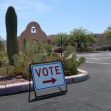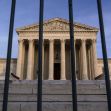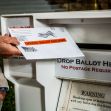The voting case Republican Party of Pennsylvania v. Boockvar technically should have ended in Pennsylvania with the state supreme court’s decision. The highest authority on a state’s laws is that state’s judiciary—not the federal one. Justice Samuel Alito describes the petitioning of this state-decided matter to the U.S. Supreme Court as a “last ditch attempt to prevent the election in Pennsylvania from being conducted under a cloud.”
However, on Wednesday, October 28, despite the relative irregularity of such handling, the U.S. Supreme Court issued an order on the case. The Justices temporarily declined to produce a final decision on Republican Party of Pennsylvania v. Boockvar, denying an expedition of their consideration.
“I reluctantly conclude,” Justice Samuel Alito wrote in his opinion, “That there is simply not enough time at this late date to decide the question before the election.” His brief opinion was joined by Justices Clarence Thomas and Neil Gorsuch.
In September, the Pennsylvania Supreme Court handed down a 4-3 decision that allowed ballots to be counted even after arriving a maximum of three days after November 3. The decision came in light of Pennsylvania’s Act 77, passed by the state legislature in early spring. As a safety measure for the COVID-19 pandemic, it significantly expanded mail-in ballots and permitted voting by mail across the state. However, the law maintained a deadline: all ballots must be received no later than 8 pm on November 3.
The state supreme court decided to permit more leniency. As long as a ballot is postmarked before or on Election Day and received up to three days after, it would be counted. Unmarked or illegible postmarks, too, would be given the benefit of the doubt. As it stands, this is the procedure in Pennsylvania. However, since the U.S. Supreme Court remains poised to reverse the state court’s ruling soon after the election, voters in Pennsylvania should proceed with the assumption that their mail-in ballots will not be counted if received after November 3.
Despite the Supreme Court’s momentary non-decision, Alito says in his opinion that the state court’s order “squarely alters an important statutory provision enacted by the Pennsylvania Legislature…to make rules governing the conduct of elections for federal office.”
Alito also imbues the case with potential, saying that it “has national importance.” This denotes a strong nod to the application of the eventual decision—meaning if and when the High Court makes a ruling on Pennsylvania’s voting matter, it will likely apply to many similar litigations throughout the country. In the same sentence, Alito alludes to a probable loss for the state supreme court since “there is a strong likelihood’ that their decision was a constitutional violation.
Based on Alito’s opinion, it appears the U.S. Supreme Court is ready to issue a quick ruling after November 3. He says the state court’s decision “calls out for review” by Alito and the other Justices, and he laments the pre-election time crunch preventing such an examination.
Furthermore, the opinion is explicit about the limitations of the order itself. Alito clarifies that the Court’s standing order “is not a denial of a request for this Court to order that ballots received after election day be segregated so that if the (Pennsylvania Supreme Court)’s decision is ultimately overturned, a targeted remedy will be available.” For now, ballots received in the state within three days of November 3 will be isolated and, depending on the decision, possibly eliminated from the official count.
The first time Republican Party was heard in the Supreme Court, the Justices landed on a 4-4 tie, which allowed the state court’s decision to stand. At the time, the now-confirmed Justice Amy Coney Barrett had not yet been sworn in. This time, Barrett did not take part in the motion; she could still contribute to the case’s ruling in the future.
Other states are in the midst of parallel court conflicts regarding the General Election and the validity of mail-in voting. Pennsylvania’s case could become a national example set to dictate how the rest of the country counts votes during this unprecedented election season.






